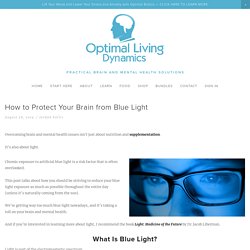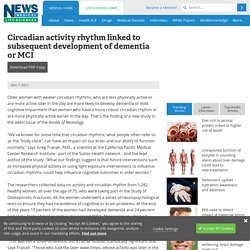

Clearing brain fog: The importance of circadian rhythms - Hack your gut. Brain fog describes an inability to think or focus.

It also presents with poor mood and lack of motivation. Often it comes paired with other conditions such as: Multiple SclerosisPOTSThyroid disordersChronic fatigue syndromeAlzheimer’s diseaseAging. The area of the brain dedicated to motivation, emotion, learning and memory is the hippocampus. During Alzheimer’s disease, the hippocampus is one of the initial areas of the brain to become damaged. Based on the symptomology behind brain fog, it seems obvious that it involves the hippocampus. Circadian rhythms and brain fog When we look at what circadian rhythms do, it’s clear why the hippocampus is important. Furthermore, factors that promote a strong circadian rhythm promote new nerve formation in the hippocampus. However, many think that syncing circadian rhythms simply involves tinkering with light exposure. But clearing brain fog requires much more than these 2 aspects of circadian rhythms.
Entraining the hippocompaus Conclusion Like this:
How to Protect Your Brain from Blue Light — Optimal Living Dynamics. It’s also well-established that blue light at night sends a signal to your body that it’s daytime, which increases the amount of time it takes to fall asleep and reduces the quality of your sleep.

It does this by significantly suppressing the production of melatonin, your body’s sleep hormone (27-34). Melatonin is also an antioxidant that protects your brain and increases mitochondrial function. So chronically low melatonin can lead to lower mental energy and neurodegeneration (35-37). In my experience, if your circadian rhythm is thrown off and you’re not sleeping well, it's very hard to be completely healthy and emotionally balanced. Studies show that exposure to blue light at night is significantly associated with depression (23). Other research has found that “higher nighttime light intensity” leads to lower melatonin levels, which contributes to depression and cognitive impairment (24).
But luckily there are ways to protect yourself. 1. 2. But luckily there are ways to protect yourself. Circadian activity rhythm linked to subsequent development of dementia or MCI. Dec 7 2011 Older women with weaker circadian rhythms, who are less physically active or are more active later in the day are more likely to develop dementia or mild cognitive impairment than women who have a more robust circadian rhythm or are more physically active earlier in the day.

That's the finding of a new study in the latest issue of the Annals of Neurology. "We've known for some time that circadian rhythms, what people often refer to as the "body clock", can have an impact on our brain and our ability to function normally," says Greg Tranah, PhD., a scientist at the California Pacific Medical Center Research Institute - part of the Sutter Health network - and the lead author of the study.
"What our findings suggest is that future interventions such as increased physical activity or using light exposure interventions to influence circadian rhythms, could help influence cognitive outcomes in older women. " Source California Pacific Medical Center.
Circadian rhythm of genes in brain changes with aging, research shows. Examination of thousands of genes from nearly 150 human brains shows the circadian rhythm of gene activity changes with aging, according to a first-of-its-kind study conducted by researchers at the University of Pittsburgh School of Medicine.

The findings, published online in the Proceedings of the National Academy of Sciences, suggest also that a novel biological clock begins ticking only in the older brain. A 24-hour circadian rhythm controls nearly all brain and body processes, such as the sleep/wake cycle, metabolism, alertness and cognition, said senior investigator Colleen McClung, Ph.D., associate professor of psychiatry, Pitt School of Medicine. These daily activity patterns are regulated by certain genes that are found in almost all cells, but have rarely been studied in the human brain. "Studies have reported that older adults tend to perform complex cognitive tasks better in the morning and get worse through the day," Dr. McClung said. Is ADHD really a sleep problem? New findings linking abnormalities in circadian rhythms to neurochemical to changes in specific neurotransmitters.
Results of the first study of its kind to link abnormalities in circadian rhythms to changes in specific neurotransmitters in people with bipolar disorder will be published this week in the journal Biological Psychiatry.

The three-year study conducted by McLean researchers points to specific neuroanatomical changes in human subjects with these illnesses, and specifically to neurons that regulate anxiety and stress response, according to Harry Pantazopoulos, PhD, assistant neuroscientist at McLean's Translational Neuroscience Laboratory and instructor in psychiatry at Harvard Medical School. "For more than 50 years, there's been evidence that there's something wrong with circadian rhythms in people with bipolar disorder, but there has been a huge gap in terms of what we understand about their brains and how altered circadian rhythms are contributing to their symptoms," noted Pantazopoulos, lead author of the study. The paper provides three main, previously unreported findings: New role for brain's support cells in controlling circadian rhythms.